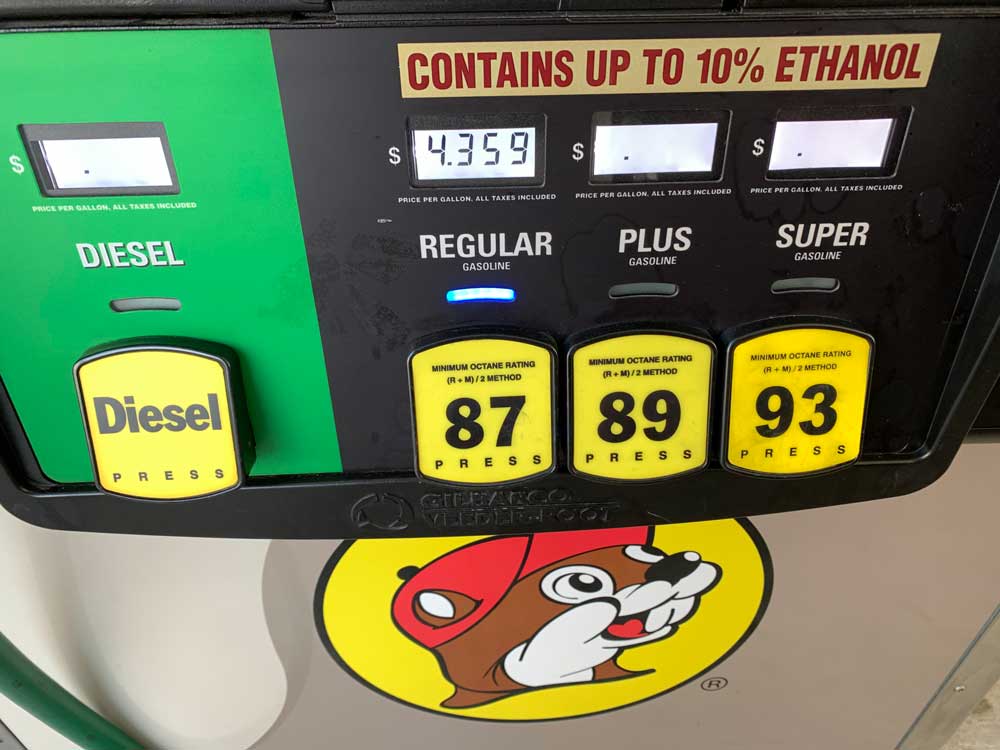
Gas prices are not tumbling yet, but they’re falling, and they may continue to fall as oil producers increase production, supplies increase and fears of recession slow demand.
Gas prices have been falling at more than 10 cents a week for the past three weeks, dropping to a Florida-wide average of $4.54 per gallon on Tuesday.
In Palm Coast, gas was selling at $4.53 to $4.69 a gallon along guzzlers’ alley on State road 100 Thursday–$4.53 at Wawa and Shell, $4.59 at Mobil, $4.69 at RaceTrac, but $4.53 at the RaceTrac on Palm Coast Parkway and several other stations in Palm Coast. The lowest price in the region was at Buc-cees off I-95 and LPGA Boulevard, where it was selling for $4.29 a gallon, and $4.21 a gallon across the street at Sam’s Club.
After dipping below $100 a barrel this week–the lowest price since May–oil prices were back up above that threshold, trading at around $103 to $105 today. It had peaked at nearly $124 on March 8.
“Gas prices are being dragged lower by falling crude oil prices, which suffered steep losses Tuesday, on worries of a global economic slowdown,” said AAA spokesman Mark Jenkins. “If these futures price drops hold, drivers could see Florida gas prices drift back below $4.10 per gallon. However, this is still an extremely volatile fuel market, and we’ve seen oil prices rebound so many times in the past several months.”
Over the holiday weekend, drivers found the most expensive Independence Day gas prices on record. The average price on July 4th was $4.55 per gallon. That’s $1.54 per gallon more than last year’s holiday, and 49 cents per gallon more than the previous record-high of $4.06 per gallon, set back on July 4, 2008. But those are unadjusted numbers. In inflation-adjusted cost, that gas price in July 2008 would have been $5.51 today, so this year’s record is not, in fact, a record except in nominal figures.
Regional Prices
- Most expensive metro markets – West Palm Beach-Boca Raton ($4.72), Naples ($4.64), Miami ($4.63)
- Least expensive metro markets – Crestview-Fort Walton Beach ($4.38), Panama City ($4.43), Melbourne-Titusville ($4.44)
| Gas Price Overview | Oil Price Overview |
| Tuesday’s Avg. Price – $4.54 per gallon
Cost for a Full Tank – $68 (15 gallons) 2022 High – $4.89 per gallon (6/13/22) 2021 High – $3.36 per gallon (Nov. 2021) Record High – $4.89 per gallon |
Friday’s U.S. Oil Price – $99.50 per barrel
Previous Week’s Closing Price – $108.43 per barrel 2022 High – $123.70 (Mar. 8, 2022) 2021 High – $84.65 per barrel (Oct. 2021) Record High – $145.29 per barrel (July 2008) |






























Jimbo99 says
The bad news is the million dollar food bank drive in Flagler County ramping up & preparing for the recession in Biden’s America. Let me guess more supply chain shortages forthcoming ?
MikeM says
Can someone explain why the numbers have to be adjusted at the bottom of this article ?
FlaglerLive says
If you don;t adjust for inflation, the comparison between nominal figures from one year to the other would be inaccurate, or at least deceptive.
Ray W. says
Are you telling FlaglerLive readers that the $3.32 national average that we were paying for gasoline on January 1, 2008, has to be adjusted for inflation for us to properly understand what we were paying back then when Republican executive branch policies reigned supreme?
According to Inflation Calculator, since January 1, 2008, we have experienced inflation totaling 35.76%. Simple use of multiplication tells us that we need to add $1.19 to that $3.32 average, which yields a sum of $4.51 in today’s dollars for a gallon of gas on January 1, 2008. Oy vey!
Somebody needs to tell this to Jimbo99, before he dons once again his partisan hat and comments without the appropriate exercise of intellectual rigor.
I am not saying that gasoline prices should be more or less than what they are today. I am saying that we have been here before, for a multitude of reasons that coalesced in 2008. Just as reasons existed in 2008, today’s reasons can also be understood.
OPEC voted to cut crude oil production in February 2021 and has not fully restored production to its pre-cut levels. Russia invaded the Ukraine and the crude oil disruption caused by that act has yet to be resolved. Neither international event can be traced to the Biden administration, yet both of them can be properly characterized as “supply chain shortages.” Not enough crude oil in the supply chain and the entire world’s gasoline prices rise.